
The Bayreuth Festspielhaus or Bayreuth Festival Theatre is an opera house north of Bayreuth, Germany, built by the 19th-century German composer Richard Wagner and dedicated solely to the performance of his stage works. It is the venue for the annual Bayreuth Festival, for which it was specifically conceived and built. Its official name is Richard-Wagner-Festspielhaus. It is the home of the Bayreuth Festival Orchestra.

The Zurich Opera House is an opera house in the Swiss city of Zurich. Located at the Sechseläutenplatz, it has been the home of the Zürich Opera since 1891, and also houses the Bernhard-Theater Zürich. It is also home to the Zürich Ballet.
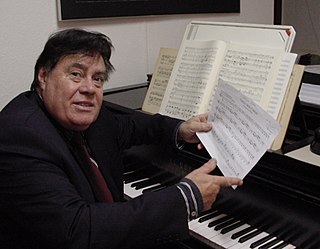
Walter Steffens is a German composer. He is noted for the diversity of his creative works, but has specialised in opera, such as Eli, as well as music inspired by paintings.

The Cologne Opera refers to both the main opera house in Cologne, Germany and its resident opera company.

The Nordwestdeutsche Philharmonie is a German symphony orchestra based in Herford. It was founded in 1950 and, along with Philharmonie Südwestfalen and Landesjugendorchester NRW, is one of the 'official' orchestras (Landesorchester) of the state of North Rhine-Westphalia. The orchestra has been shaped by conductors such as Wilhelm Schüchter, Hermann Scherchen and Andris Nelsons. They have regularly served several cities in northwest Germany, and toured internationally to halls such as Berliner Philharmonie, Tonhalle Zürich and Großes Festspielhaus in Salzburg, also to the U.S. and Japan.

Wilhelm Schüchter was a German conductor. He was Generalmusikdirektor in Dortmund from 1962 until his death. He opened the new opera house in 1966 with Der Rosenkavalier by Richard Strauss, and conducted the world premiere of the opera Eli by Walter Steffens after the drama of Nelly Sachs in 1967. He left a legacy of opera recordings, especially of excerpts sung in German.
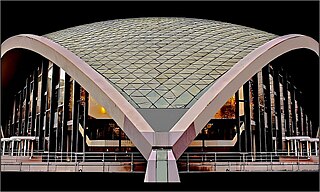
Opernhaus Dortmund is the opera house of Dortmund, Germany, operated by the Theater Dortmund organisation. A new opera house opened in 1966, replacing an earlier facility which opened in 1904 and was destroyed during World War II. It was built on the former site of the Old Synagogue, which was demolished by the Nazi local government in the 1930s.

The Dortmunder Philharmoniker are a German symphony orchestra based in Dortmund. The orchestra of the Theater Dortmund performs opera in the Opernhaus Dortmund and concert in the Konzerthaus Dortmund. The orchestra was founded in 1887 and has been shaped by conductors such as Wilhelm Schüchter, Marek Janowski, Moshe Atzmon and Jac van Steen.

The Internationale Maifestspiele Wiesbaden is a theater festival in Wiesbaden, Germany. Established in the late 19th century after the Bayreuth Festival, the festival is one of the most distinguished international theatre and music festivals in the world. It is presented annually in May at the Hessisches Staatstheater Wiesbaden, the State Theatre of Hesse in the capital Wiesbaden. The festival currently features performances of operas, ballets, plays and musicals. Visiting companies, mostly from European theaters, present their recent productions along with performances of the Theater Wiesbaden. Concerts from a wide array of music genres are featured as well as artistic circus acts and modern dance presentations. Lectures, recitals, cabaret performances, art showings and readings are also part of the program.

The Latvian National Opera and Ballet (LNOB) is an opera house and opera company at Aspazijas boulevard 3 in Riga. Its repertoire includes performances of opera and ballet presented during the season which lasts from mid-September to the end of May. During a typical season, LNOB presents almost 200 performances, including, on average, 6 new productions. The largest is the Great Hall which houses 946 seats, while the smaller ones – the New Hall, the Dress Circle Hall (Beletāžas zāle) and the Red Hall – have a maximum seating capacity of 338, 170 and 100 respectively. LNOB employs a total of approximately 600 people. The building is located on the bank of the Riga Canal, near the Freedom Monument. As of 5 November 2019, the chairman of the board is Egils Siliņš, a world renowned opera singer. The chief conductor since 2013 is Mārtiņš Ozoliņš who is also an associate professor at the Jāzeps Vītols Latvian Academy of Music. The artistic director since 1993 is Aivars Leimanis.

The Ljubljana Slovene National Theatre Opera and Ballet, or shortly Ljubljana SNG Opera and Ballet, is Slovenia's national opera and ballet company. Its seat is the Ljubljana Opera House at 1 Župančič Street in Ljubljana. The Ljubljana Slovene National Theatre Opera and Ballet was founded in 1918. It is now a subsection of the Slovene National Drama Theatre in Ljubljana (Slovensko narodno gledališče and has about 50 dancers. Since 2013, its director has been the lawyer Peter Sotošek Štular, and its artistic director the opera stage director Rocc.
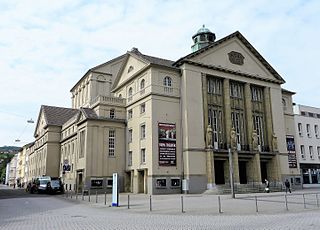
Hagen Theatre is a performance venue in Hagen, North Rhine-Westphalia, Germany. It offers musical theatre, ballet, plays, children's and young people's theatre, and concerts by the Philharmonic Orchestra Hagen.
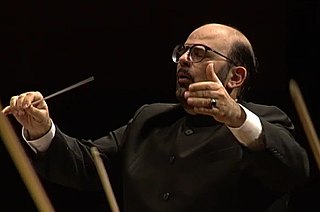
Myron Michailidis is a Greek conductor, since 2019 Artistic Director of the new Cultural and Conference Center of Crete (CCCC), in Heraklion, Greece. He is regarded today as one of the most important Greek conductors.
Hans Wallat was a German conductor, GMD in Bremen, at the Nationaltheater Mannheim, Theater Dortmund and Deutsche Oper am Rhein. A specialist for the stage works of Richard Wagner, he appeared at the Bayreuth Festival and internationally.
Albert Dohmen is a German operatic bass-baritone who is known internationally for performing leading roles by Richard Wagner and Richard Strauss. He has also worked in concert halls and given lieder recitals.
Jeff Martin is an American operatic tenor who made a career based in Germany, singing at international opera houses and concert halls. Focused on character roles, he has appeared as Mime in Wagner's Der Ring des Nibelungen and Herod in Salome by Richard Strauss, and appeared in several world premieres.
Hans Herbert Jöris was a German conductor and academic teacher who worked at the Theater Dortmund and the Staatsoper Hannover and taught at the Hochschule für Musik, Theater und Medien Hannover.
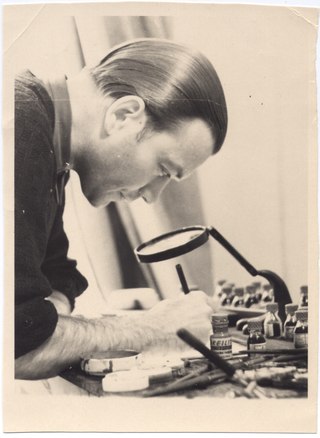
Hainer Hill was a German scenic designer, costume designer, painter, graphic artist and theatre photographer who was based in Berlin and worked internationally. After studying painting in Frankfurt, he worked at the Oper Frankfurt, assisting Caspar Neher. Together they moved to Brecht's Berliner Ensemble where Hill created an iconic stage for Mutter Courage and took hundreds of scene photographs now archived at the Akademie der Künste. When the Berlin Wall was erected, Hill, who lived in the West and had worked in the East, began to work freelance, including at the Royal Opera House. In 1966 he became director of scenery (Ausstattunggsleiter) at Opernhaus Dortmund, and there he created the stage for the world premiere of Eli by Walter Steffens, which was followed by 45 other productions. Hill is best remembered for his focus on light projection.
Eli, Op. 7, is a German-language opera in three acts with music by Walter Steffens to a libretto based on a play by Nelly Sachs. The world premiere was in 1967 at the Opernhaus Dortmund.
Paul Hager was a German theatre and opera director.

















